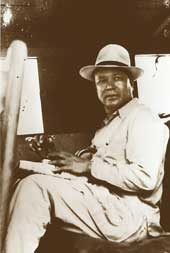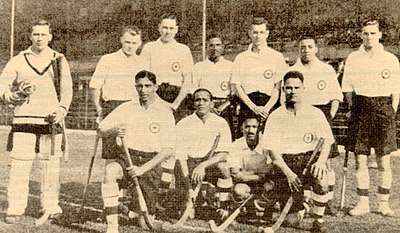Jaipal Singh Munda
JAIPAL SINGH MUNDA (3 January 1903 – 20 March 1970) was a politician, prolific writer and sportsman. He was the member of the Constituent Assembly which debated on the new Constitution of the Indian Union. He captained the Indian field hockey team to clinch gold in the 1928 Summer Olympics in Amsterdam.
 | ||||||||||||||||
| Personal information | ||||||||||||||||
|---|---|---|---|---|---|---|---|---|---|---|---|---|---|---|---|---|
| Born |
3 January 1903 Takra Pahantoli, Ranchi, Bihar Province (now in Jharkhand), British India[1] | |||||||||||||||
| Died |
20 March 1970 (aged 67) New Delhi, India | |||||||||||||||
| Playing position | Defender | |||||||||||||||
| Senior career | ||||||||||||||||
| Years | Team | Apps | (Gls) | |||||||||||||
| – | Wimbledon Hockey Club | |||||||||||||||
| National team | ||||||||||||||||
| Years | Team | Apps | (Gls) | |||||||||||||
| India | ||||||||||||||||
Medal record
| ||||||||||||||||
Later he emerged as a campaigner for the causes of Adivasis and the creation of a separate homeland for them in central India. As a member of the Constituent Assembly of India, he campaigned for the rights of the whole tribal community.
Early life
Jaipal Singh Munda, also known as Pramod Pahan, was born in a Munda tribal family, on 3 January 1903 in Takra, Pahan Toli village of what was then Khunti subdivision (now declared district) of the then district of Ranchi in the Bihar Province of British India (in the present-day State of Jharkhand).[2][3]
In childhood, Singh's job was to look after the cattle herd. After initial schooling at the village church school, in 1910 he gained admission to St. Paul's College, Ranchi, which was run by the Christian Missionaries of the SPG Mission of the Church of England. A gifted field hockey player, Singh was a brilliant student and exhibited exceptional leadership qualities from a very young age. This was noticed by the missionaries, who took him to England for higher studies at the University of Oxford. He graduated from St. John's College, Oxford with Honours in Economics.[4]
Singh was selected to work in the Indian Civil Service, from which he later resigned. In 1934, he became a teacher at the Prince of Wales College at Achimota, Gold Coast, Ghana. In 1937, he returned to India as the Principal of the Rajkumar College, Raipur. In 1938, he joined the Bikaner princely state as foreign secretary.[5]
Singh thought that with his varied experience he could be more useful to the country if he worked in the sphere of education. He wrote letters to the Bihar Congress President, Rajendra Prasad, asking to be allowed to contribute to Bihar's education sector, but received no positive answers. In the last month of 1938, Singh visited Patna and Ranchi. During this visit, he decided to enter politics by seeing the poor condition of the tribal people.[6]
Hockey player

Singh was a member of the Oxford University Hockey Team. The hallmarks of his game as a deep defender were his clean tackling, sensible gameplay and well directed hard hits. He was the most versatile player in the Oxford University Hockey Team. His contribution to the University Hockey Team was recognised and he became the first Indian student to be conferred blue in Hockey.[7]
In 1928, while he was in England, Singh was asked to captain the Indian hockey team for the 1928 Olympic Games. Under his captaincy the Indian team played 17 matches in the league stage, of which 16 were won and one drawn. Due, however, to a dispute with the English team manager, A. B. Rossier, Singh left the team after league phase and therefore could not play in the games in the knockout stage. In the final, the Indian Team defeated Holland by 3–0.[8]
On returning to India, Singh was associated with Mohan Bagan Club of Calcutta and started its hockey team in 1929. He led that team in various tournaments. After retirement from active hockey, he served as Secretary of Bengal Hockey Association and as a member of the Indian Sports Council.
Adivasi Mahasabha
Singh became president of Adivasi Mahasabha in 1939. In 1940 at Ramgarh session of Congress, he discussed with Subash Chandra Bose for need to form separate state Jharkhand. Subash Chandra Bose replied that such request will have affect the freedom struggle.[9] After the independence of India, the Adivasi Mahasabha re-emerged as Jharkhand Party and it accommodated non-tribal people to achieve long-term goals. He is popularly known as "Marang Gomke (meaning Great Leader) by the Adivasis of Chhotanagpur.[10][11]
Jharkhand Party participated in election in 1952 and won 33 seats in Bihar legislative assembly. In 1962, It won 20 seats. Jharkhand party submitted memorandum for creation of separate state to States Reorganization Commission but the demand was not conceded because the region had many languages and had not any link language, tribal were not in majority and adverse effects of economy of state after separation.
Jaipal Singh was disappointed due to declining popularity of his party and rejection of State demand by States Reorganization Commission. He merged his party with Indian National Congress in 1963. However entire file and rank did not join the Congress.[12]
Role in the Constituent Assembly debates
Singh was a gifted speaker and represented all the tribal people of India at the Constituent Assembly of India (which was responsible for drafting the constitution of Independent India). The following is an excerpt from a famous speech made by him, where, while welcoming the Objectives Resolution, he highlighted the issues faced by the Indian tribals:
As an Adibasi, I am not expected to understand the legal intricacies of the Resolution. But my common sense tells me that every one of us should march in that road to freedom and fight together. Sir, if there is any group of Indian people that has been shabbily treated it is my people. They have been disgracefully treated, neglected for the last 6,000 years. The history of the Indus Valley civilization, a child of which I am, shows quite clearly that it is the newcomers — most of you here are intruders as far as I am concerned — it is the new comers who have driven away my people from the Indus Valley to the jungle fastness ... The whole history of my people is one of continuous exploitation and dispossession by the non-aboriginals of India punctuated by rebellions and disorder, and yet I take Pandit Jawahar Lal Nehru at his word. I take you all at your word that now we are going to start a new chapter, a new chapter of independent India where there is equality of opportunity, where no one would be neglected.[13][14][15]
Jaipal Singh[16] was a part of 3 Committees including Advisory Committee.[17]
Death
Singh died of cerebral hemorrhage on 20 March 1970 at his residence in New Delhi. He was 68, and left behind four children — a daughter and three sons.[18]
A stadium named after him opened in Ranchi in 2013.[19]
Jaipal singh munda stadium opened in Indira Gandhi National Tribal University , Amarakntak By VC Prof. T.V. Kattimani 2019.
Published work
- Lo Bir Sendra : an autobiography : A memoir of Jaipal Singh Munda published in 2004. Edited by Rashmi Katyayan and published by Prabhat Khabar Publications, Ranchi.
- Adivasidom: a collection of the articles and speeches of Jaipal Singh Munda, written in the 1940-50s, published in July 2017. Edited by Ashwini Kumar Pankaj and it has published by the Pyara Karketta Foundation, Ranchi.
See also
- List of Indian hockey captains in Olympics
- Field hockey in India
- India national field hockey team
References
- "Jaipal Singh - Making Britain". www.open.ac.uk.
- "A 'Jungli' In The Constituent Assembly: Jaipal Singh Munda".
- "Jaipal Singh - Making Britain". www.open.ac.uk.
- "Jaipal Singh". www.tribalzone.net.
- "Jaipal Singh Munda - Mainstream Weekly". www.mainstreamweekly.net.
- Ashwini Kumar Pankaj (2015). मरङ गोमके जयपाल सिंह मुंडा (2015 ed.). Vikalp Prakashan, Delhi. ISBN 978-938269531-8.
- "Story of our first Olympic captain Jaipal Singh".
- Field hockey at the 1928 Summer Olympics#Gold medal match
- Sinha, Anuj Kumar (101-01-01). Unsung Heroes of Jharkhand Movement. books.google.co.in. ISBN 9789352660001. Check date values in:
|date=(help) - "The Telegraph - Calcutta (Kolkata) - Jharkhand - Reunion bells ring for Jharkhand Party factions". www.telegraphindia.com.
- "This is Our Homeland: A Collection of Essays on the Betrayal of Adivasi Rights in India". EQUATIONS. 27 January 2018 – via Google Books.
- Small States Syndrome in India. books.google.com.
- "CADIndia". cadindia.clpr.org.in. Archived from the original on 29 March 2019. Retrieved 12 March 2018.
- "Tribal Zone".
- Ramachandra Guha (2008). India After Gandhi: The History of the World's Largest Democracy. ISBN 978-006095858-9.
- "CADIndia". cadindia.clpr.org.in. Retrieved 12 March 2018.
- "CADIndia". cadindia.clpr.org.in. Retrieved 12 March 2018.
- "Jaipal Singh Dead". The Indian Express. 21 March 1970. p. 7. Retrieved 10 February 2018.
- "Welcome hug from Hotwar sports hub". The Telegraph. 5 February 2013. Retrieved 10 February 2018.